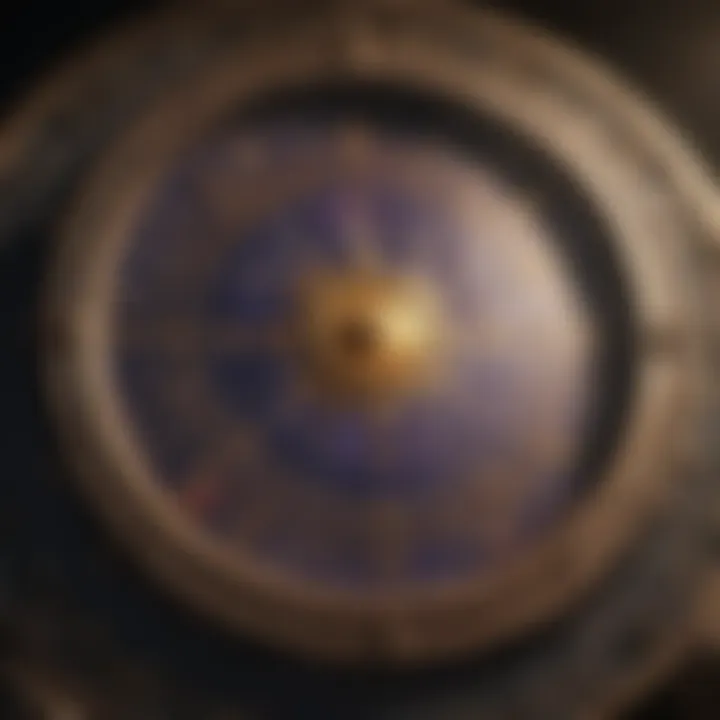Discovering Your Astrological Chart: A Comprehensive Guide


Intro
Astrology offers a unique lens through which to view our individual lives. One of the core components in astrology is the astrological chart, which serves as a visual representation of the celestial bodies at the moment of your birth. Understanding how to find and interpret this chart can unveil insights into your personality, strengths, and challenges. To embark on this journey, it is crucial to gather essential birth data and utilize various tools that can generate an accurate chart.
Characteristics of Each Zodiac Sign
In astrology, the twelve zodiac signs each exhibit distinct characteristics, encompassing unique personality traits, strengths, and weaknesses. When someone reflects on their astrological profile, knowing these traits can help interpret how they align with the stars.
Overview of Personality Traits
Each zodiac sign corresponds to specific personality traits, influencing behavior and choices. For instance, Aries is often described as impulsive and adventurous, while Libra tends to be diplomatic and aesthetic.
Strengths and Weaknesses
Understanding these strengths and weaknesses can foster personal development. A Scorpio may possess deep emotional insight as a strength, yet could struggle with jealousy. Recognizing these traits allows individuals to embrace their gifts while addressing areas for growth.
Compatibility with Other Signs
Astrological compatibility is another pertinent aspect. Each sign interacts differently with others. For example, a Sagittarius often finds harmony with fire signs like Aries and Leo, but may clash with more grounded earth signs, such as Capricorn or Taurus. This interplay of signs forms a complex web, enhancing personal relationships.
Understanding Birth Charts
An astrological birth chart is a detailed map of the sky at the time of birth. It comprises several crucial components:
Components of a Birth Chart
A birth chart includes the positions of the sun, moon, and planets across the twelve houses, reflecting various life areas such as relationships, career, and personal development.
How to Interpret Planetary Positions
Planetary positions highlight where different energies play out in daily life. For instance, a person with their Mars in Gemini may express assertiveness through communication, whereas Mars in Capricorn could indicate ambition and discipline.
Impact of Zodiac Signs on Personality
The interplay of zodiac signs on the birth chart creates a complex matrix influencing personality. The sun sign often represents core identity, while the moon sign indicates emotional landscape, and the rising sign adjusts how others perceive an individual. Together, they present a nuanced portrait.
Astrological Events and Celestial Occurrences
Keeping an eye on significant astrological events enhances understanding of personal experiences. Events like lunar and solar eclipses can reveal potent periods of change, while planetary retrogrades often encourage reflection and reassessment.
Lunar and Solar Eclipses
Eclipses herald transitions and can signal endings or new beginnings, depending on their placements within the signs and houses.
Retrogrades of Planets
A retrograde planet may call for introspection. For example, a Mercury retrograde often leads to miscommunications or technological issues, urging individuals to review and refine their thoughts.
Key Astrological Dates to Watch Out For
Certain dates resonate more due to astrological significance. Marking these dates provides insights into when to take specific actions or reflect on internal processes.
Beginner’s Guide to Astrology
For those new to astrology, understanding the basic concepts offers a foundational framework for further exploration.
Basics of Horoscopes, Zodiac Signs, Tarot, and Astrology
The core of astrology begins with the twelve zodiac signs and their horoscopes, which provide daily, weekly, and monthly predictions based on celestial positions.
Utilizing Insights from Readings for Personal Development
The insights from astrological readings serve as a mirror, enabling individuals to leverage their understanding effectively. By noting significant aspects of their charts and experiences, they can navigate life's challenges with greater awareness.
In summary, discovering one's astrological chart is not just about knowing your zodiac sign, but delving deep into its intricate elements to understand yourself and your connections with others. As you traverse this realm, maintain the awareness of how the universe's energies converge in your unique life path.


Understanding Astrological Charts
Understanding astrological charts is crucial for anyone interested in astrology. These charts serve as a map of the celestial bodies at the time of your birth. They provide insights into personality traits, life challenges, and potential paths. By grasping the components and meanings within the chart, one can gain deeper knowledge of oneself and how various influences shape life.
Definition of an Astrological Chart
An astrological chart, often referred to as a natal chart, is a complex graphical representation of the positions of the planets, the Sun, and the Moon at a specific moment in time. This moment is typically the exact time of a person’s birth. The chart consists of angles, lines, and symbols that correlate with different celestial bodies and their aspects. This visual representation allows astrologers to analyze influences affecting an individual’s character and experiences over their lifetime.
Components of a Chart
Planetary Positions
Planetary positions indicate where each celestial body was located in the zodiac at the time of birth. Each planet represents different aspects of human life. For instance, the Sun can signify core identity, while the Moon relates to emotions and subconscious. Understanding these placements provides essential insights into personal tendencies and behavioral patterns. The primary feature of planetary positions is their direct association with personality traits, making them very popular in astrological analysis. However, the interpretation can sometimes be complex, depending on the chart’s configuration.
Houses
Houses represent different areas of life, such as relationships, career, and home. There are twelve houses, each with its own significance. For example, the first house relates to self-image and personal beginnings, while the seventh house deals with partnerships and marriage. The key aspect of houses is their ability to highlight how different life events and experiences will unfold over time. They provide a framework for understanding where various planetary influences manifest. However, interpreting houses may require a solid grounding in astrology, which can be a challenge for newcomers.
Aspects
Aspects are the angles formed between planets in the chart. They symbolize the relationships and interactions between different celestial bodies. Common aspects include conjunctions, squares, and trines. The distinctive feature of aspects is their role in illustrating how planetary energies interact within a person's life. For instance, a harmonious aspect can signify ease and support, while a challenging aspect may indicate tension and conflict. Aspects can often complicate chart analysis due to the nuanced ways they affect overall interpretation.
"The complexity of an astrological chart lies in its interwoven components, each revealing layers of meaning and insight."
Understanding these fundamental components of an astrological chart equips an individual with the knowledge needed to begin their exploration. By analyzing planetary positions, houses, and aspects, one can start to decode the intricate messages hidden within their chart, thus uncovering a richer sense of self and destiny.
The Importance of Birth Data
Birth data serves as the cornerstone of astrological chart construction. The accuracy of one's astrological chart heavily relies on specific birth details. If even one element is incorrect or approximated, the interpretations derived from the chart may not reflect the individual's true astrological makeup.
Key Elements of Birth Data
- Date of Birth: This is the most fundamental aspect, marking the day and year an individual was born. It influences the sun sign, which many individuals are familiar with. However, this is just the beginning of the astrological profile.
- Time of Birth: Often overlooked, the time of birth has significant ramifications on the chart. It affects the rising sign and the precise position of the planets in the houses. Without it, a complete understanding of the chart is challenging.
- Place of Birth: The geographical location is crucial. Different time zones and latitudes affect planetary positions, thus altering the chart's nuances.
Understanding these elements allows the individual to unlock their astrological potential. One must approach birth data with care, considering any uncertainties or estimates, as they may lead to broad generalizations in astrological interpretations. To illustrate the importance, consider that both the sun and moon positions change frequently, thereby emphasizing the need for precise time and location details.
For those eager to explore astrology more deeply, accurate birth data is not merely beneficial; it is essential. As one shifts from general knowledge to a more nuanced understanding through proper data, the journey into personal astrology unfolds intricately.
Without accurate birth data, the astrological chart may remain incomplete, limiting insights and understanding of one’s astrological identity.
Date of Birth
The date of birth is the first piece of information needed for astrological chart creation. This details the sun's position at the moment of birth, which directly correlates with the sun sign. The sun sign may be the most recognized astrological aspect, but it is only part of the whole picture. The birth date positions the individual in the larger framework of zodiac cycles, influencing key personality traits and characteristics.
Astrologers often examine the sun's cycle in relation to other planetary movements to draw a comprehensive profile. Notably, various asteroids and celestial bodies also interact during one's birth time, leading to a unique astrological fingerprint.
Time of Birth
The time of birth is critical in astrology for determining the rising sign, also known as the Ascendant. This sign represents how individuals present themselves to the world and is calculated based on the exact time and location of birth.
An inaccurate time may displace the ascendant sign, leading to misinterpretations of personality traits. Additionally, the time influences the positioning of planets in the twelve houses of the astrological chart. Each house governs different life areas, such as relationships, career, and personal growth. Hence, without precise time data, the interpretations may lack depth.
Place of Birth
The place of birth plays a significant role in constructing the astrological chart. Geographical location helps adjust for time zone differences and allows for accurate calculations of planetary positions in relation to the Earth.
Astrologers consider latitude and longitude to understand how planets were aligned at the time of birth. This geographical aspect indicates how celestial energies manifest in the individual's life, influencing experiences and opportunities. Ignoring this element compromises the chart's integrity and relevance.
In sum, obtaining exact birth data—date, time, and location—is paramount for a meaningful astrological analysis. By valuing these details, one can pave the path toward a deeper understanding of personal astrological influences.
Finding Online Tools for Chart Generation
In the age of technology, finding astrological tools online has become accessible to many. Today, you can generate your astrological chart without the need for extensive knowledge or experience in astrology. This section highlights the significance of online tools, how they simplify the chart generation process, and the various options available.
Using online tools can save time and provide results with accuracy. Many of these tools utilize complex algorithms that take into account the user's birth data and generate a detailed chart reflecting the positions of celestial bodies at the time of birth. This is especially beneficial for those who may not have access to professional astrologers or prefer a DIY approach to astrology. Convenience and immediacy are key factors driving the popularity of online chart generation.
Astrological Software Options


Astrological software is an excellent resource for those looking to dig deeper into their charts. These programs can provide comprehensive interpretations and analyses that are often beyond basic online tools. Many options exist varying in complexity, user interface, and cost.
- AstroGold: This is a professional-grade software that offers a variety of features for both casual users and professional astrologers.
- Solar Fire: Known for its rich features and customizable settings, this software provides detailed chart analysis and is used in many astrological services.
- Kepler: This program is user-friendly and incorporates a wide range of techniques for chart analysis, making it suitable for both novices and experienced astrologers.
With these options, users can create complex charts and gain insights into personal trends and events.
Free Online Chart Generators
If you are seeking free options, there are numerous online chart generators that can deliver satisfactory results without any financial commitment. These platforms might lack the depth of paid software but are ideal for basic chart interpretation.
Some popular free generators include:
- Astro.com: Offers free chart generation with various options for interpretations.
- Cafe Astrology: Provides an easy-to-navigate interface with quick chart generation.
- AstroSeek: Allows free generation of charts and offers various calculations that might be useful.
Utilizing these sites can give you a quick overview and original insights into your astrological profile.
Mobile Applications
With smartphones being so prevalent, mobile applications have emerged as a convenient tool for astrology enthusiasts. These apps provide on-the-go access to chart generation and personalized readings.
Here are a few notable applications:
- Co-Star: Uses data from NASA to create precise charts, offering daily insights based on your chart.
- TimePassages: A popular app providing real-time charts and interpretations, it is suitable for users at varying levels of experience.
- AstroFuture: Allows users to create charts, providing detailed explanations for planetary positions and aspects involved in one's chart.
Overall, mobile applications provide an easy way to engage with astrology anytime and anywhere.
Interpreting Your Astrological Chart
Interpreting your astrological chart is a crucial step in understanding your personal characteristics, life events, and potential future outcomes. Each component of an astrological chart carries unique significance, giving insights into your personality and how you relate to the world around you. By delving into this interpretation, individuals can unlock layers of meaning that influence their daily lives and long-term goals. The following sections will guide you through essential elements that shape your astrological narrative.
Understanding Zodiac Signs
Zodiac signs form the core of astrological interpretation. There are 12 signs, each corresponding to specific personality traits and tendencies. For instance, Aries is often associated with assertiveness and leadership, while Pisces may embody creativity and sensitivity.
When you look at your astrological chart, the position of the Sun at your birth determines your primary zodiac sign. This sign reflects your core self and can provide clarity on your intrinsic motivations. To further comprehend this, consider how your Sun sign resonates with your experiences and behaviors.
Analyzing Planetary Placements
Planetary placements offer deeper insights beyond just the zodiac sign. Each planet holds a specific meaning: for example, Venus governs love and relationships, while Mars is linked to energy and aggression. The position of these planets at the time of your birth influences various aspects of your life.
- Natal chart positions: This refers to the location of each planet within the signs and houses.
- Transits: These are current positions of planets as they move through the zodiac, affecting how their energies interact with your natal placements.
Understanding these placements allows you to gain insight into your relationships, career, and personal development.
The Role of Houses in Interpretation
Houses divide your astrological chart into 12 segments, each representing different life areas such as career, home, and relationships. The way planets align with these houses can inform you about how you should approach life situations.
- First House: It involves the self and appearance.
- Seventh House: This house pertains to partnerships and relationships.
- Tenth House: It focuses on career and public life.
The significance of the houses lies in their ability to demonstrate how and where planetary energies manifest in your life. A well-rounded interpretation should always consider planetary placements in the context of houses, providing a comprehensive view of how energies influence your experiences.
Key Takeaway: Understanding astrological charts is not merely about identifying traits; it is an intricate analysis of how celestial influences guide personal journeys.
Common Chart Patterns
Understanding common chart patterns is vital for anyone looking to gain deeper insights from their astrological chart. Each pattern has unique characteristics that can influence a person’s life path and personality. Recognizing these patterns can offer clarity and context. It can also assist astrologers in making informed predictions and analyses. The patterns discussed below include the Grand Trine, T-Square, and Stellium. Each plays a distinct role in shaping one’s astrological narrative.
Grand Trine
A Grand Trine occurs when three planets form a triangle in the same elemental quality. This pattern suggests ease in the affairs represented by the planets involved. The elements can be fire, earth, air, or water, influencing how the traits of these planets manifest. People with a Grand Trine often experience harmony in their lives. They may find skills or talents come effortlessly. However, it is important to note that an excess of ease can lead to complacency, diminishing efforts toward personal growth.
The harmonious aspects of a Grand Trine can foster comfort, but they can also encourage stagnation if not actively challenged.
T-Square


The T-Square features two planets in opposition with a third planet forming a square to both. This design indicates heightened tension and challenges. Individuals may feel a constant push and pull between conflicting desires or needs. While this tension can lead to frustration, it also motivates growth and the pursuit of solutions. Those with a T-Square often become resilient problem solvers. Learning to navigate the challenges presented by this pattern can cultivate significant character development over time.
Stellium
A Stellium comprises three or more planets clustered in the same sign or house. This concentration amplifies the characteristics of the sign or house involved. A Stellium may signify intense focus on specific areas of life. This focus can manifest as extraordinary passion or skill in particular endeavors. However, an overemphasis can lead to an imbalance. It is essential for individuals with a Stellium to remain aware of other aspects of their chart. Harnessing the strengths of a Stellium while mitigating potential pitfalls can lead to fulfilling outcomes.
Additional Resources for Chart Exploration
Exploring one's astrological chart goes beyond just generating it. Engaging deeply with the principles and knowledge of astrology can enrich one's understanding greatly. Additional resources play a crucial role in this process. They offer diverse perspectives and insights, enhancing the foundational knowledge gained from basic chart interpretations. Accessing relevant books, taking courses, and participating in communities can provide both theoretical and practical frameworks necessary for nuanced comprehendition of astrology.
Books
Books are a primary source of in-depth information about astrology. They cater to various levels of understanding, from beginners to seasoned practitioners. Titles like The Only Astrology Book You'll Ever Need by Joanna Martine Woolfolk and Astrology for the Soul by Jan Spiller stand out for their comprehensive content. Each book can provide specific insights into themes such as planetary transits, personal chart analysis, and zodiac characteristics, linking theory with practical applications.
- Benefits of Reading Books:
- Enhance foundational knowledge.
- Provide comprehensive analyses and interpretations.
- Offer varied viewpoints from expert astrologers.
Reading frequently can cultivate a more nuanced understanding of the intricacies involved in astrological practice.
Courses and Workshops
Participating in courses and workshops can facilitate hands-on learning. These educational programs can vary significantly in their depth and scope. Workshops often focus on practical skills, such as chart reading, while courses may delve into more theoretical concepts, covering aspects ranging from historical astrology to predictive techniques.
- Considerations for Courses:
- Look for accredited instructors.
- Choose programs that align with your learning style.
- Evaluate the community opportunities they offer.
Many institutions and online platforms, like The Astrology School and Astrology University, offer structured courses. This can accelerate personal growth in astrology, allowing for direct engagement with teachers and peers.
Astrology Forums and Communities
The internet has birthed a plethora of forums and communities that cater to astrology lovers. Engaging with these communities can provide real-time discussions, diverse viewpoints, and shared experiences relevant to astrological practice. Websites such as reddit.com/r/astrology and astrological groups on facebook.com allow individuals to connect with like-minded people.
- Benefits of Online Communities:
- Exchange insights and personal interpretations.
- Ask questions and get peer feedback.
- Discover local meetups and events.
Being part of a community fosters a sense of belonging and provides support when navigating complex astrological questions. It can also help maintain motivation in ongoing learning and practice.
"While the knowledge from books and courses is invaluable, the insights from a community often provide the practical and emotional support needed to truly engage with astrology."
Overall, investing time in additional resources fortifies one’s experience in astrology. Whether through individuals books, structured courses, or supportive communities, each resource enhances the journey of astrological exploration.
Frequently Asked Questions
The Frequently Asked Questions section serves an important role in demystifying common concerns regarding astrological chart generation. It provides clarity on various aspects of the process, addressing potential misunderstandings and hesitations. By engaging with these questions, readers can gain deeper insight into the reliability and methods for obtaining an accurate astrological chart. Furthermore, this section guides individuals in determining the necessity of consulting professionals in astrological matters, enhancing their overall understanding.
Can generate my chart without an exact time of birth?
In the realm of astrology, timing is key. The specific time of birth is critical when creating an astrological chart. It determines the ascendant sign and the placement of houses, both essential elements in understanding one's unique astrological profile. Without this time, your chart will lack certain details that help provide a complete picture. For example, the Sun and Moon may be accurately cast, but much of the personal insight offered by other planets will be missing.
If you do not know your exact birth time, some online tools allow a general chart generation using only the date and place of birth. However, be aware that the accuracy diminishes significantly. You might get a rough idea, but the finer details will not resonate as strongly. Many suggest contacting parents or hospitals for precise data if it is available. This way, you can ensure that the most accurate birth data is used for generating your astrological chart.
How accurate are online charts?
The accuracy of online charts can be a point of debate among seasoned astrologers and novices alike. Many online astrological tools utilize algorithms based on time-tested astrological principles. However, the precision of the output greatly depends on the accuracy of the input data. If the birth date, time, or location entered is even slightly off, the chart generated may provide misleading or inaccurate results.
Here are a few points to consider when evaluating the accuracy of online charts:
- Input Accuracy: Ensure the birth data entered is as precise as possible.
- Software Quality: Different platforms have varying levels of sophistication in their algorithms.
- Interpretive Depth: While many tools can generate a chart, the richness of the interpretation can vary.
"Often, a good astrologer will provide insights that automated software cannot match."
For the best results, it's wise to consult multiple online tools and analyze the outputs collectively, keeping in mind their limitations.
Do need to consult an astrologer?
Whether consulting an astrologer is necessary depends on individual needs and desires. A professional astrologer can provide personalized insights that a generic online chart interpretation may lack. Here are some considerations:
- Complex Interpretations: If your chart has complex patterns or placements, an astrologer can guide you to understand nuances that might be missed through automated tools.
- Holistic Approach: Astrologers often integrate various modalities, adding depth to the reading through interactive discussion, which can enhance understanding.
- Life Guidance: For those seeking life direction or decisions based on astrological insights, a professional's experience can offer valuable guidance.
In summary, while generating an astrological chart online may suffice for casual inquiries, consulting an astrologer can elevate one's practice, providing insights tailored to your unique context. It is not a necessity for everyone, but a consideration worth making if deep analysis is desired.







